
“Learn again how to post content and be creative and build stuff.”
These words rang in my ears after listening to Amber Case on The Open Web. It reminded me of the time when I first “got” the web, and ever since then I’ve wanted to be part of building it.
The web is a maker’s dream: all you really need is a text editor and your imagination. From there you are only a couple of steps away from a world of other people to collaborate and share experiences with. That’s also part of what I love about working with a distributed team – it rings true with the web.
And these days, it’s never been easier to publish something. You can twiddle your phone and moments later everyone in your network knows what you’re thinking. This is an amazing power, but how much do we take it for granted? In a lot of ways we’ve traded ease of publishing and discovery for the independence of our creative abilities.
Aral Balkan articulates it so well as the path leading to Digital Feudalism. Failure to own our creative ability leads to disempowerment and atrophy of those abilities. We might find our online experiences becoming more seamless and convenient, but in turn they also become less powerful (and maybe less you). If we truly are becoming cyborgs, let’s make sure we keep the brain 😉
The best way to really get a feel for this is to experience it first-hand. Try reaching out to a group of contacts with a question, selected because you value and trust their opinion. How do you publish that question? How do they discover your question and respond? How do you curate that list of contacts in the first place?
It’s not that there are no solutions outside of networks like Facebook and Twitter, but in comparison, the alternatives are awkward at best and the difficulty of circumventing these closed services seems relative to our dependence on them.
The answer isn’t a better API, what we lack is the basic building blocks for a social web that put the common user’s online identity into their own hands. When that happens, you can bet it will be big.
There’s a reason why so many web developers are self-taught. You imagined something, and then you went and figured out how to make it, with maybe a View Source along the way. I am eagerly looking forward to the next era of the social web that follows this same spirit.
TABLE OF CONTENTS



